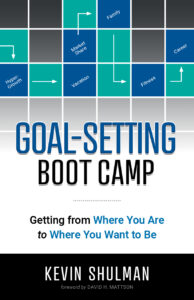The Magic of Goal Setting
If you’re reading this, you are most likely a goal-setter. You regularly have to-do lists. You want to achieve. Most of our readers are people who are share this trait, this drive to succeed.
Having studied and participated in goal-setting for decades, I loved seeing so many of the best practices outlined in a book. When GOAL-SETTING BOOT CAMP: Getting From Where You Are To Where You Want To Be crossed my desk, I enjoyed the reminder of the techniques I have used and some new ideas to be at my best. I reached out to the author, Kevin Shulman, a certified Sandler trainer.
What mistakes do most people make when thinking about goal setting?
The biggest mistake people make is that they start with their business goals. For example they say that they want to sell 15% more this year. Or, they’d like to get a 20% raise. Unfortunately, these are just numbers, and not very motivating in and of themselves.
The “right” way to do it is to start with Personal goals. Everything from family and relationship goals to health/fitness and hobby goals. Of course, most of us have “stuff” goals as well. First figure out what you want your life to look like a year from now, five years from now and in retirement. Then figure out what you need your business to do to deliver those goals. Now the number is truly motivating.
Why is it important to write down goals?
Study after study suggests that writing down goals makes all the difference. I believe that this should be done with pen and paper, rather than on a computer screen. There is something visceral about putting pen to paper. It makes it real and cements into your sub-concious mind, where goal setting takes root.
While writing down a list of goals is good, it’s much better to also write down plans for achieving those goals. A goal without a plan is just a wish. Everyone wants to be a millionaire, but people with plans to make it usually do.
What are some of the benefits of goal setting?
To me, the biggest benefit of goal setting is that it puts me in control of my life. David Sandler once said, “Either you’re a part of your own plan, of a part of someone else’s.”
Of course, the most direct benefit of goal setting is that when you do it right, it works. People who practice goal setting tend to be happier and make more money than people who don’t. It’s really that simple.
As you have worked with many individuals on this system, what have you noticed is common? Are there common pitfalls?
There are lots of mistakes people make when setting goals. The most common is that they don’t take it seriously. Goal setting is serious business. A goal to lose weight made while drunk on New Year’s Eve is not serious. Most people spend more time planning a 2-week vacation than they spend planning the rest of their lives.
Another big mistake is to not think about what you must give up. For example, say you want to go to the gym for an hour a day (it’s really 2 hours with drive time and shower time). What 2 hours are you going to give up? TV time?….time with your kids?…. sleep? If you don’t think it through and commit, you’ll likely fall back to old habits.
I have seen many people focused on career or financial goals, but they don’t think about other important areas such as self-esteem or friendship goals. How do you encourage individuals to embrace all of the various areas?
I’m glad you brought up self-esteem goals. I could argue that for many people this might be the most important of all. One of the bonuses of goal setting is that it’s great for building self-esteem. Every time you accomplish even a small or partial goal, it makes you feel better about you, and nothing is more important than that.
There is no correct number of goals, nor is there a correct number of areas of your life.
Educational goals and spiritual goals for example are vital to some people, while others tend to stay more concrete. Some of us have goals that are more personal. For example, as a collector I have wine goals. I have one client who has 20 different categories for her goals, and I say good for her.
What are some ways to help someone who struggles with identifying their core values?
I believe that it’s important to go through a “value audit” prior to goal setting. Most companies have statements of mission, vision and core values. I think it’s important to also have a personal mission statement and list of your core values. That is those internal values that monitor and drive your decision making, which in turn leads to your actions and behaviors. Knowing this on a conscious level helps to prioritize when setting goals.
I find that this exercise is easy for some and difficult for others. I work with my clients on a number of exercises to help them get “in touch” with their core values. The most important thing for someone struggling with this is to take it seriously. Don’t just move on after 5 minutes thought. Take an hour or more to think about it and talk it through with someone you know and trust. Usually, in less than an hour, with a little discussion, most people can work it out.
How should leaders use this book with their teams?
Encourage team members to take the book home and go through the process, preferably with a significant other. I would even give my staff a day off just for the project. Then sit down with each one and ask them what they want their life to look like a year from now, five years from now and in retirement. That’s when amazing things happen. Just by asking the question, you are implying that you are willing to help them achieve their goals (and you should mean it!). Once they realize that you are willing to help them, they will be more willing to help you attain your goals for your business. It’s the ultimate win-win. Sometimes you might even find out you have someone who wants to be you in the next five years. How great would that be, to find someone who wants to grow in your company?
Tell us more about The Business Doubler tool.
The biggest problem with the Doubler is that people don’t believe it can be done. Their first reaction to the very idea of the tool is that it’s impossible. In fact, the biggest problem I have with business owners is that they set their goals too low.
The Doubler works by forcing the owner to analyze his/her business and look at the 6 or 8 areas of the business that are holding them back or can contribute to growth. Areas like personnel or other infrastructure issues may be on the list. Perhaps it’s sales or marketing. Then there are areas most don’t think about like referral generation. My point is that if you identify these areas and then set up plans to improve on all of them, the 100% growth becomes not only possible, but something that can be done year after year.
For more information, see GOAL-SETTING BOOT CAMP: Getting From Where You Are To Where You Want To Be.
Image credit: Ronnie Overgoor

